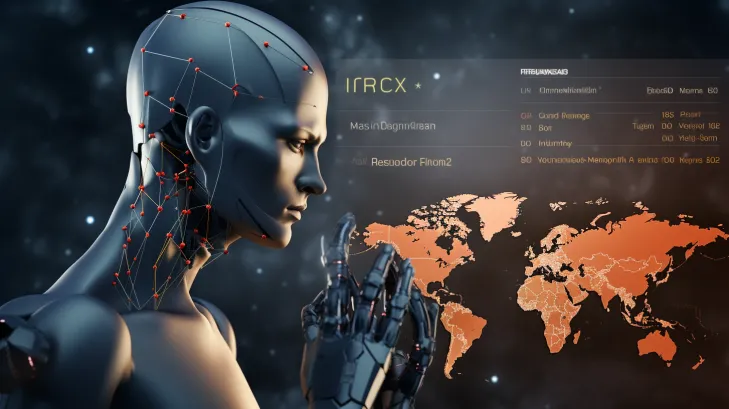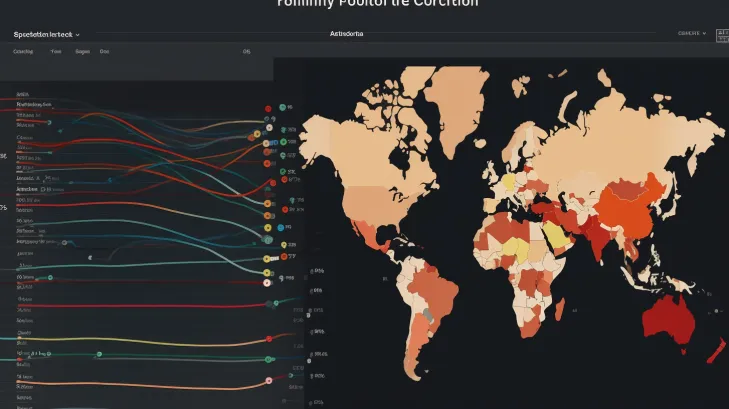Table of Contents
In this article, we will examine the leading 20 countries in the field ranking for AI. Furthermore, we have explored the most recent advancements in artificial intelligence. If you prefer to bypass our comprehensive analysis, you can directly proceed to our article titled “Artificial Intelligence 2023 Country Rankings: Top 5.”
AI has become an integral part of our daily lives, infiltrating various domains such as our smartphones’ virtual assistants and the algorithms that shape our social media experiences. Its influence is clearly visible in groundbreaking advancements like self-driving cars, which rely on machine learning to maneuver through intricate traffic situations, and facial recognition software, utilized for security measures and tailored advertising.
Moreover, ranking for AI has revolutionized the agricultural sector, automating tasks on an unparalleled level. For further information on this topic, refer to the list of the top 20 ranking for AI and Robotics Companies that are reshaping the agriculture industry.

What are the latest advancements in ranking for AI for the year 2023?
In a groundbreaking study unveiled at the American Heart Association’s Scientific Sessions 2023, the integration of AI with electrocardiogram (EKG) testing showcased a remarkable decrease in the time required to diagnose and treat individuals suffering from heart attacks.
Carried out at a hospital in Taiwan, this technology managed to reduce the duration of diagnosis and transfer to the cardiac catheterization laboratory by nearly 10 minutes, greatly benefiting patients with ST-elevation myocardial infarction (STEMI).
The ranking for AI-enabled EKGs demonstrated an impressive 88% positive predictive value and an astonishing 99.9% negative predictive value, accurately identifying cases of STEMI. It is worth noting that this AI technology also succeeded in reducing the waiting time for treatment from 52 to 43 minutes, thereby solidifying its potential to revolutionize heart attack care through faster and more precise diagnoses.
The trial encompassed a vast cohort of over 43,000 patients, with the ranking for AI-enabled EKGs correctly diagnosing STEMI in seven hospitalized patients, as opposed to just one with standard care.
It is no secret that ranking for AI has transformed various industries, and it is important to note that the manufacturing industry is no exception. According to a report by BBC, 89% of almost 1,800 manufacturing executives have expressed their desire to incorporate ranking for AI into their production processes.
This is evident in PepsiCo Inc (NASDAQ: PEP)’s Coventry factory, which has implemented ranking for AI-powered sensors by Augury to identify potential machine failures. These sensors have been trained on more than 300 million hours of machine data and analyze audio cues and vibrations to detect specific malfunctions, enabling predictive maintenance and reducing downtime.
This is particularly significant as even a minute of factory downtime can result in significant financial losses. Furthermore, ranking for AI-powered computer vision is utilized to identify defects in products on conveyor belts, ensuring the quality of intricate items such as computer chip wafers.
PepsiCo Inc (NASDAQ: PEP) is leveraging ranking for AI and machine learning to revolutionize its purchase validation process and bolster loyalty strategies. By incorporating receipt capture and data extraction into its JOY customer loyalty app, PepsiCo Inc (NASDAQ: PEP) has significantly reduced the time required for purchase validation from 7 to 11 days to mere seconds.
Through a partnership with tech provider Verify, PepsiCo Inc (NASDAQ: PEP) employs real-time computer vision to capture receipt images and extract valuable information regarding customer behavior, purchasing specifics, and the competitive landscape. This automated approach has not only resulted in cost savings and heightened fraud prevention measures but has also generated invaluable cross-basket customer data to enhance loyalty programs.
We have compiled the artificial intelligence 2023 country rankings by combining the rankings from the Global Artificial Intelligence Index 2023 on Kaggle and Tortoisemedia. By averaging the rankings from both indexes, we have created our final rankings. The list is arranged in descending order based on the rankings. In the event of countries having the same rank, the one with a higher Kaggle Index is given a higher ranking.

Below is a compilation of the top nations ranking for AI
Spain has recently implemented the inaugural EU AI Act regulatory sandbox, which permits businesses to conduct trials of ranking for AI-driven products and services. This initiative will encourage other member states to establish their own AI regulatory sandboxes. The sandbox serves as a platform for collaboration between AI system providers and users, facilitating testing in accordance with the requirements of the ranking for AI Act.
Supported by the European Commission, its objective is to enhance understanding of regulatory compliance and aid in the development of technical guidance.
Sweden is spearheading an effort to build a comprehensive language model specifically tailored for Nordic languages, including Danish, Swedish, Norwegian, Icelandic, and Faroese. This ambitious project, led by ranking for AI Sweden and supported by the Swedish Innovation Agency, aims to develop language models that cater primarily to the public sector.
By addressing the current limitations in accessing foundational models like GPT-3, Sweden is positioning itself as one of the frontrunners in the field of artificial intelligence by 2023.
Luxembourg is home to Gcore, a cloud provider that is at the forefront of the ranking for AI revolution in Europe. With its global infrastructure and platform services, Gcore caters to various industries such as gaming, healthcare, Fintech, and media. In order to further enhance its offerings, the company intends to create AI clusters throughout Europe, including the Gcore Generative AI Cluster for model training.
Denmark is a leading country in the field of artificial intelligence, as evidenced by its impressive rankings on the Kaggle AI Index and Tortoise AI Index. Additionally, a study conducted at Arhus University demonstrated Denmark’s advancements in ranking for AI through the use of deep learning and facial analysis to predict political leanings with 61% accuracy. Overall, Denmark’s commitment to AI research and development has positioned it as a major player in the global AI landscape.
Ireland, with a ranking for AI Index of 19 on Kaggle and 12 on Tortoise, has become a hub for enterprise AI advancements. In a collaborative effort, Uniphore and Workair are working together to enhance the capabilities of contact centers in the country. Leveraging Uniphore’s X Platform and various AI solutions such as conversational AI, generative AI, knowledge AI, and emotion AI, Workair aims to empower clients by deploying customer-centric solutions. With an average rank of 15.5, Ireland is making significant strides in the field of ranking for AI.
India has demonstrated its leadership in the field of ranking for AI through various initiatives. One notable example is the launch of Air India’s virtual AI agent, ‘Maharaja,’ which is the world’s first of its kind. Powered by Microsoft Corp’s Azure OpenAI service, Maharaja efficiently handles a significant volume of daily queries across multiple languages and diverse areas of expertise.
With an impressive success rate of 80% in providing quick and accurate responses, Maharaja significantly reduces the reliance on human intervention. This achievement highlights India’s commitment to developing advanced AI tools and technologies.
Japan is known for its advancements in artificial intelligence, particularly in the automotive industry. Japanese automakers such as Honda, Sony Honda Mobility (SHM), and Subaru are embracing generative AI in their vehicle designs. For instance, Honda showcased the Sustaina-C Concept, a small electric vehicle, at the Japan Mobility Show, which utilized image-generative AI. Toyota is also exploring the use of image-generative AI in car design.
Additionally, Sony Honda Mobility plans to leverage generative AI’s large language model to develop an autonomous driving system and ADAS for its EV Afeela, with the goal of launching it in 2025. With these developments, Japan continues to be recognized as one of the leading countries for artificial intelligence jobs.
Switzerland has been making significant strides in the field of AI, as evidenced by the latest developments in the country. For instance, Securitas AG, a Swiss security firm, has recently deployed an autonomous robot developed by Ascento, a robotics start-up from ETH Zurich. This two-wheeled patrol bot with foldable “legs” and wheels serves as an additional security layer, utilizing a thermal camera and a 360° camera to detect people and vehicles.
It communicates with a control center via live feed and aims to enhance operational efficiency.
Australia has been ranked 13th in the Kaggle AI Index with a score of 15, and 11th in the Tortoise AI Index. Microsoft Corp (NASDAQ: MSFT) has announced its plan to invest $3.2 billion in Australia over two years to enhance the country’s artificial intelligence and cloud computing capabilities. This investment will include a 250% increase in computing capacity, expansion of the data center footprint from 20 to 29 sites, and support for skills training for 300,000 Australians. Additionally, Australia is known for its advanced engineering capabilities.
France is making a strong push to establish itself as the primary hub for artificial intelligence in Europe. President Emmanuel Macron has declared that France is currently the top AI player on the continent and has pledged significant investments in research and training. Despite the United States’ dominance in the field, France is determined to narrow the gap and gain a more competitive advantage.
Finland is at the forefront of AI research, with advanced knowledge and a dynamic startup ecosystem that has strong ties to universities. Notably, prominent companies have established dedicated AI development units, while startups flourish in key sectors such as healthcare, manufacturing, and business services.
The country’s appeal extends to global giants like Amazon.com Inc (NASDAQ: AMZN) and NVIDIA Corp (NASDAQ: NVDA), further enhancing Helsinki’s position as the 20th-best emerging startup ecosystem. Finland stands as one of the leading nations in the field of artificial intelligence.
The Netherlands is making strides in the field of artificial intelligence. One of its notable initiatives is the development of GPT-NL, a large language model that aims to provide a transparent and fair alternative to proprietary AI chatbots.
Unlike closed processes in Silicon Valley, GPT-NL is an open-source model that allows public scrutiny of its software and decision-making processes. This move addresses concerns about ethical standards in AI development and solidifies the Netherlands’ position as one of the top European countries in artificial intelligence in 2023.
Germany is increasing its investment in artificial intelligence (AI) research by almost 100%, with plans to allocate almost one billion euros ($1.1 billion) in the next two years. The goal is to bridge the gap in AI skills between China and the United States. Germany is also recognized as a top destination for studying AI, thanks to its exceptional education system and innovative AI developments.
South Korea has seen a rise in the adoption of AI-driven virtual humans, such as Zaein created by Pulse9, with a Tortoise AI Index of 7 and an average rank of 6.5. These virtual humans, designed to resemble real actors, are gaining popularity in Seoul where they perform various tasks like singing and selling luxury clothes on television. Pulse9, an AI company, specializes in crafting digital humans for major South Korean conglomerates, aiming to meet the corporate ideals of the perfect employee. It is projected that the global market for these AI creations will reach $527 billion by 2030.
Israel’s AI industry has experienced significant growth in a short period of time. According to Remagine Ventures, the number of Israeli generative AI startups has more than doubled from 67 to 144 in just five months. This growth is reflected in the Kaggle AI Index, which ranks Israel at 5, and the Tortoise AI Index, which ranks Israel at 7.
Additionally, the Israeli Gen AI industry has secured $2.3 billion in funding by September 2023. These startups are involved in various generative applications, including text, code, visual media, and video generation, and are active in sectors such as gaming, entertainment, education, commerce, health, and life sciences.





